John Pugh (artist)
| John W. Pugh | |
|---|---|
| Born |
Date of birth: May 2, 1957 Lake Forest, Illinois |
| Residence | Truckee, California |
| Nationality | American |
| Education | B.A. in Art (painting emphasis) 1983, California State University, Chico |
| Occupation | Mural Artist |
| Known for | Trompe-l'oeil Murals, Paintings |
| Style | trompe-l'oeil |
| Awards | Distinguished Alumni Chico State 2003, Master Mural artist award (Precita Eyes Mural Center) San Francisco, CA 2006 |
John Pugh (born 1957) is an American artist known for creating large trompe-l'oeil wall murals giving the illusion of a three-dimensional scene behind the wall. Pugh has been creating his murals since the late 1970s. He attended California State University Chico, receiving his BA in 1983 and the Distinguished Alumni Award in 2003. He has received over 250 public and private commissions in the United States, Canada, Mexico, Barbados, Japan, Taiwan, and New Zealand. He currently lives and works in Truckee, California. His particular style of trompe-l'oeil painting has been called "Narrative Illusionism."
His works have been described as "not merely ornamental or curiously clever. They are thought-provoking, substantial, and sometimes even philosophical or spiritual. What separates the murals of John Pugh from their less consequential cousins is that he goes beyond trompe l’oeil by combining techniques of illusion with narrative or conceptual elements and thereby not only “fools the eye” but captures the imagination and engages the mind as well."[1]
Artist Statement[2]
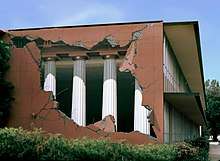
"I am a trompe l’oeil artist focusing primarily on public art. I have found that the ‘language’ of life-size illusions allow me to effectively communicate with a very large audience. People take delight in being visually tricked. Once intrigued by the illusion, the viewer is invited to visually cross into the mural to explore and discover the deeper concept of the piece. I have also found that by creating architectural illusion that integrates with the existing environment both optically and aesthetically, the art transcends the separateness that public art sometimes produces.
Public art is a very powerful form of communication, and with it comes great responsibility. To truly connect with most viewers the concept message needs to be an authentic one and in no way commercial. People crave human connection. Ironically, this humanistic draw is the most effective way to spur economic development.
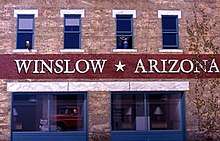
With a clear intention to create a public art attraction, I strive to design a mural in a way that is atypical or not in a commonplace mural format; that I “think of the box”. Often this includes creating an illusion that is iconic or a dynamic anomaly. The passerby is much more apt to engage with an uncommon architectural event or phenomenon while he or she unconsciously surveys the urban landscape.
Creating a ‘sense of place’ is paramount. It is important for me as an artist, to research the area and its community, formulating concepts based upon a multitude of historical, environmental, and cultural viewpoints. If the mural can serve to educate about the culture and heritage of a place, it will deepen roots, and create a pride of place. This inspires new possibilities, the sharing of ideas, and assist in bridging cultural gaps in the community.
Clarity of language allows the artwork to ‘elevate rather than alienate’, and with an initial trompe l’oeil impact that tantalizes the viewer, no translation is needed. Yet layers of heritage, the human spirit, or of dreams can be woven together in innovative ways — dynamic or subtle — that will inspire. I like to play with the mural composition so that the layers will unfold sequentially, creating a multi-dimensional narrative and prompting exploration. I also like to treat the layers as music, composing with color, texture, and form to create melodic overtones and the timbre.Ultimately the goal with the mural is to conjure fresh feelings and perceptions, and evoke a sense of connectivity with the mural, within us, and the world around us." -John Pugh
Gallery of Murals
Partial listing of John Pugh's murals.[1][3]
 Quetzalcoatl, Ecatepec de Morelos, Méx., Mexico, 2016.
Quetzalcoatl, Ecatepec de Morelos, Méx., Mexico, 2016.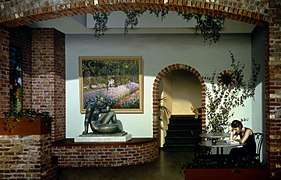 Art Imitating Life Imitating Art Imitating Life, Lindsay, CA, 1996
Art Imitating Life Imitating Art Imitating Life, Lindsay, CA, 1996 Pool of Thought, University of Alaska, Fairbanks, AK, 1999
Pool of Thought, University of Alaska, Fairbanks, AK, 1999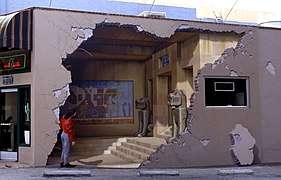 Siete Punto Uno, Los Gatos, CA, 1989
Siete Punto Uno, Los Gatos, CA, 1989 Technology of the Future Past, Los Gatos, CA, 1996
Technology of the Future Past, Los Gatos, CA, 1996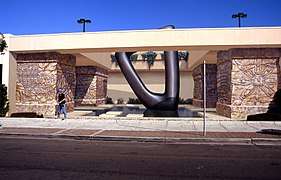 Internal Melody, Hayward, CA, 2000
Internal Melody, Hayward, CA, 2000 Seed, Sarasota County Health Center, Sarasota, FL, 2004
Seed, Sarasota County Health Center, Sarasota, FL, 2004 Light Walk, Palo Alto Medical Foundation, Palo Alto, CA, 2006
Light Walk, Palo Alto Medical Foundation, Palo Alto, CA, 2006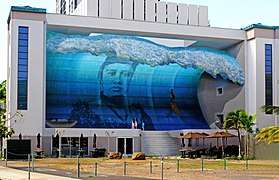 Mana Nalu, Honolulu, Hawaii, 2008
Mana Nalu, Honolulu, Hawaii, 2008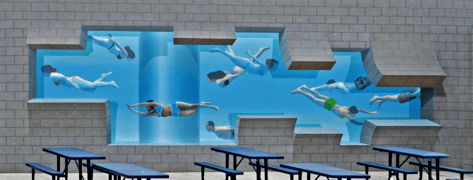 Underwater Life is Joy, Aqua Adventure Fremont Water Park, Fremont, CA, 2009
Underwater Life is Joy, Aqua Adventure Fremont Water Park, Fremont, CA, 2009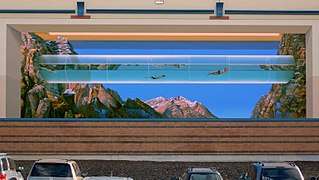 Swimming in the Zone, Westside Recreation Centre, Calgary, Canada, 2010
Swimming in the Zone, Westside Recreation Centre, Calgary, Canada, 2010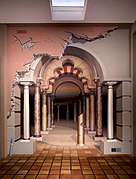 Colonnade, Los Gatos, CA, 1986
Colonnade, Los Gatos, CA, 1986 Key of C, Hermosa Beach, California, 2012
Key of C, Hermosa Beach, California, 2012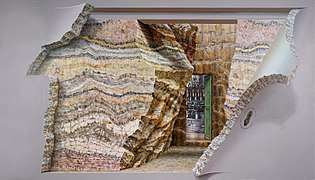 Wonderground, Los Angeles, CA, 2006
Wonderground, Los Angeles, CA, 2006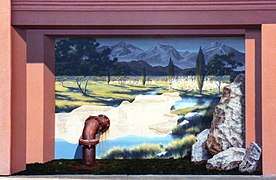 Drain, Eastern Sierra, Bishop, California, 2004
Drain, Eastern Sierra, Bishop, California, 2004 Valentine's Day, Twentynine Palms, CA, 2001
Valentine's Day, Twentynine Palms, CA, 2001
Further reading
- Bruce, Kevin. Large Art in Small Places: Discovering the California Mural Towns. Ten Speed Press, May 2009, 192pp.
- Seckel, Al. Masters of Deception: Escher, Dalí & the Artists of Optical Illusion. Sterling, Aug 2007, 320pp.
- Bruce, Kevin. The Murals of John Pugh: Beyond Trompe L'Oeil. Ten Speed Press, Sept 2006, 168pp.
See also
- Standin' on the Corner Park – discusses the Pugh mural by that name
- Trompe-l'œil
- Anamorphosis
- Murals
- Public art
Notes
- 1 2 Bruce, Kevin (2006). The Murals of John Pugh: Beyond Trompe l'Oeil. Berkeley, California: Ten Speed Press. p. 1. ISBN 978-1580087223.
- ↑ "John Pugh - Trompe L'oeil Artist, American Muralist, Optical Illusion Painter". Art of John Pugh. Retrieved 2017-04-19.
- ↑ "Trompe L'oeil Murals & Paintings - 3D Mural Art by John Pugh". Art of John Pugh. Retrieved 2017-04-18.
External links
- John Pugh's Official Website
- Google Maps, Shows locations of John Pugh's most famous murals
- Urban Mirage: The Murals of John Pugh, Video documentary exploring John Pugh's approach to trompe-l'œil
- CSU Chico, Article about John Pugh from the Fall 2002 edition of Chico Statements Magazine
- The Daily Telegraph, Picture gallery of John Pugh's work in the Daily Telegraph UK
- Creative Bloq, Article highlighting 30 mind-bending trompe l'oeil illusions
- Tahoe Quarterly Magazine, 2013 featured artist
- Trompe L’oeil The Perspective Illusionism of John Pugh, 2003 article by The Whole Mountain Source Book, Santa Cruz, CA